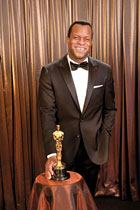film
The Prizefighter
Screenwriter Geoffrey Fletcher proves that good things come to those who stay on their feet
by Jason Hollander / GAL ’07
At the end of a nearly hourlong phone interview with Geoffrey Fletcher (TSOA ’99)—who became the first African-American screenwriter to win an Oscar last March for the film Precious: Based on the Novel “Push” by Sapphire—I note that we’d both referenced Rocky several times and ask whether he would be all right with me drawing some parallels when I write his story. “Certainly,” he answers after digesting the question a bit. He adds: “We’re not all prizefighters, but Rocky inspires us.”It would be a much easier analogy if Fletcher had been a Philly bruiser, resigned to think of himself, like Rocky did, as “just another bum from the neighborhood.” That story line is pretty distant for the New London, Connecticut, native, who is a product of Choate Rosemary Hall for high school, Harvard University for undergrad, and the Tisch School of the Arts graduate film program. But like Rocky, who labored at his craft for years in obscurity, Fletcher spent more than a decade pushing papers as an office temp by day and grinding away at his scripts each night. And like Rocky, who got an out-of-the-blue call about a heavyweight title shot, Fletcher remembers picking up his phone in 2006 to hear director Lee Daniels talking about a new movie he was co-producing with Oprah Winfrey and Tyler Perry. Fletcher had sent him a copy of his award-winning NYU student film, Magic Markers, assuming “nothing would happen.” But upon one viewing, Daniels was convinced that he’d found just the person to bring Sapphire’s novel to the screen. “It seemed too quick,” Fletcher says. “I’d heard no so many times, I didn’t think he meant it. I hoped he did. So I ran out, got the book, and was crazy about it from page one.”
And then Fletcher, like Rocky, made the most of his once-in-a-lifetime chance. The grim but poetic tale of Precious—chronicling the struggles of an impoverished, abused teen who finds a ray of light in a caring teacher—earned nearly $50 million at the box office. And along with the Oscar, Fletcher’s screenplay captured a Film Independent’s Spirit Award, an NAACP Image Award, the Grand Jury Prize at Sundance, and a slew of nominations from awards ceremonies around the world. Variety called him one of “10 Screenwriters to Watch,” and the film even earned an endorsement from former First Lady Barbara Bush. He is currently writing two new features—the girl power-themed Violet and Daisy, which he will direct, and a film based on the 1971 riot at the prison in Attica, New York, to be directed by Doug Liman (Swingers, The Bourne Identity). It seems that, at 40, Geoffrey Fletcher has officially arrived.
The journey, however, started with Martin Scorsese’s Raging Bull, which Fletcher saw as a kid and which opened his eyes to the art form. “As a means of expression, I got a glimpse of what film could be,” he recalls. He received a video camera from his parents at 14 and, like the story of so many filmmakers, he was rarely caught without it. Years later he would apprentice under Scorsese (WSC ’64, STEINHARDT ’68, HON ’92) and he studied at Tisch with Spike Lee (TSOA ’82, HON ’98). But anyone who “knows” Hollywood will tell you that a first-class education and A-list connections don’t guarantee a thing. Fletcher had to do the work and, just as importantly, not lose faith. He spent much of his twenties and thirties snagging data-entry stints to pay the bills, and in the midst of watching friends with stable jobs buy houses, he admits, “I wondered if I were, in my seemingly endless pursuit of this dream, missing out on life.” But storytelling was his life; he knew nothing else could make him happy. In the end, it was the years of writing and rewriting, of pursuing agents, of hustling to make contacts and keep focused that helped him understand a character as different from himself as Precious. “I could relate to feeling like an outsider and underestimated and rejected,” he explains.
While Fletcher has gotten slightly more comfortable hobnobbing with actors and directors he grew up admiring, he’s still only a little more than two years removed from waiting in line outside a New York City comic book store to have Quentin Tarantino autograph a special-edition DVD of Reservoir Dogs. Back in March, Tarantino was also a nominee that night for Best Original Screenplay. And when Fletcher became the first African-American winner in the Best Adapted Screenplay category, he hoisted the statue in tribute to his predecessors and his family. “When my name was called, within that utterance, there were so many others,” he says.
Now an adjunct screenwriting professor at both Columbia University and NYU, Fletcher often finds himself answering questions about how he finally broke through. “The advice I give is to constantly hone your craft and try every door into the industry,” he explains. “It may not be the front door. It may be the basement door. And sometimes it takes all that a person has.” But perhaps the best message he could have sent was that in his Oscar speech, which he delivered in his slow, soft cadence to an American TV audience of more than 41 million: “This is for everybody who works on a dream every day.”

Years of writing, rewriting, pursuing agents, and hustling to make contacts helped Fletcher to understand a character as different from himself as Precious: “I could relate to feeling like an outsider and underestimated and rejected.”







